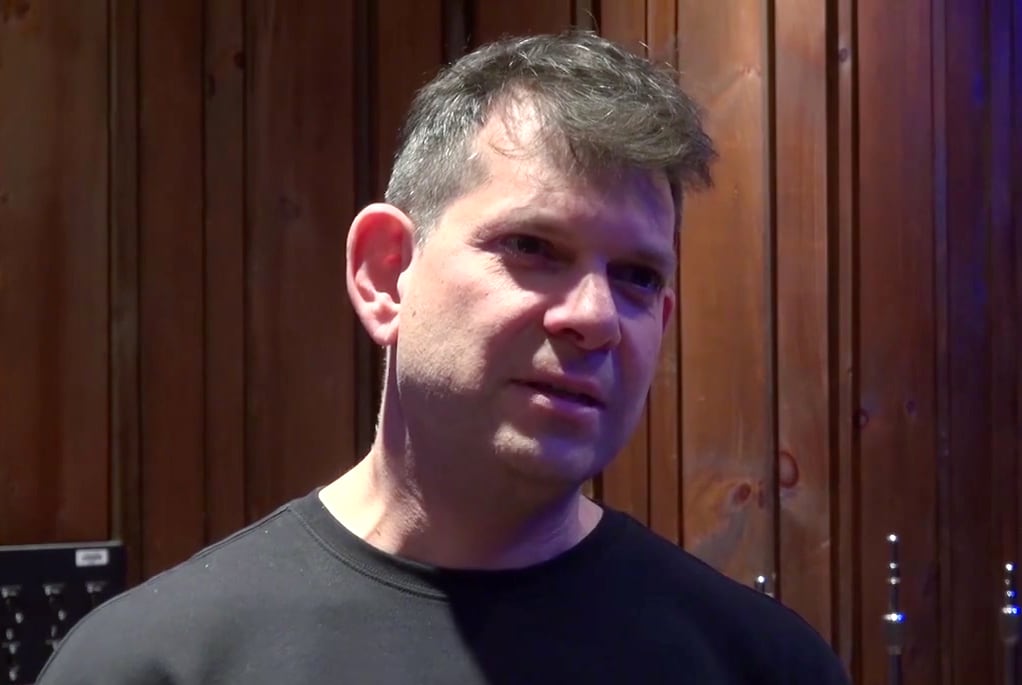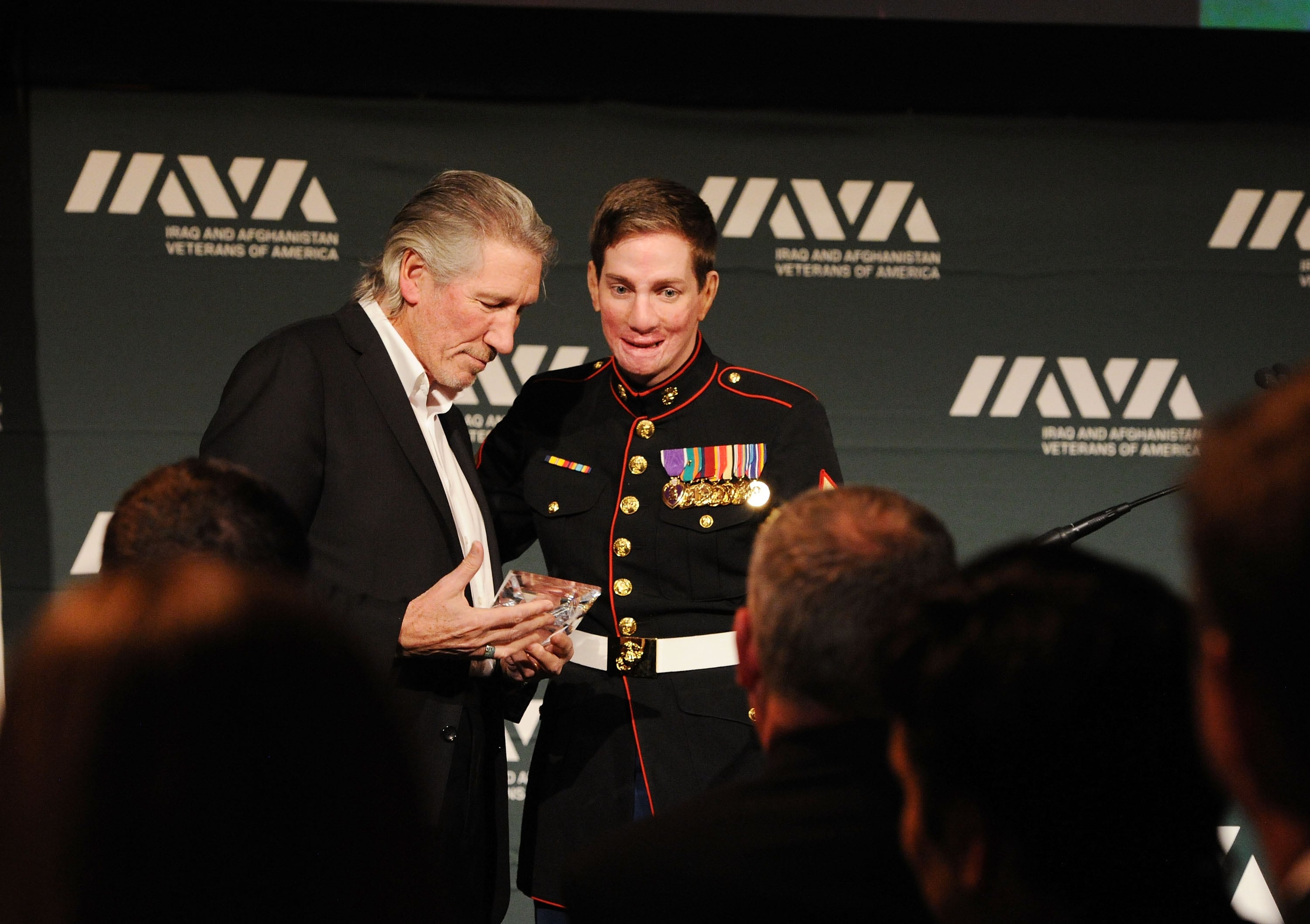ROCKVILLE, Md. — Roger Waters calls to an assistant and in his enchantingly polite English lilt requests a glass of wine. Specifically, he wants a glass of "cheap" white wine. "Since my work is now done," he says.
Waters is seated in a small soundproof room here at Omega Studios where moments prior he concluded a nearly eight-hour rehearsal with his long-time collaborator G.E. Smith and an ensemble of 11 American combat veterans, all of whom were catastrophically injured during a conflict now entering its 15th year. It's an "an honest day's work," Waters adds. "It's hard work. Everybody out there is concentrating all of the time. It's very rewarding work, but it's quite hard."
Beside him is Arthur Bloom, a fellow composer who eight years ago created MusiCorps. The nonprofit partners wounded troops recovering at Walter Reed National Military Medical Center with world-renowned performers like Waters, a singer-songwriter who co-founded the enormously popular rock band Pink Floyd in the 1960s. It's a novel program that leverages music not as therapy but to help promote a return to normalcy.
Led by Waters, the MusiCorps band is preparing for Music Heals, a benefit concert scheduled for Friday at DAR Constitution Hall in Washington, D.C. They'll be joined by Sheryl Crow, Billy Corgan of the Smashing Pumpkins and Tom Morello of Rage Against the Machine. Many people are eager to support the project. Omega Studios even donates the rehearsal space.
Waters and Bloom met with Military Times on Wednesday. Excerpts of the interview, edited for length and clarity:

Arthur Bloom, composer and founder of MusiCorps.
Photo Credit: Connor Morgan/Medill News Service
Q: Give us a sense for MusiCorps' origin and how you brought it from an idea to a place where veterans are performing alongside the likes of Roger Waters?
Bloom: I visited Walter Reed one day; I was asked to visit a soldier who'd gotten blown up and lost his leg. He'd played drums before he joined the Army, and he was concerned, among other things about "how am I going to play the drums again without my legs?" Like anybody, I wanted to help him. But stepping back, I looked at the circumstances of all of these injured veterans, who may be at Walter Reed for what could be years with little to do outside of medical appointments. And I thought: "What if we made a program for anyone, regardless of whether they played music before, who wanted to do classical or metal or rock?" We put it together as an experiment and, one after the next, everyone who could do it wanted to do it, and it just took off.
Q: Roger, you've described your work with MusiCorps as among the most rewarding of your career. Explain that further. What makes this such a special experience?
Waters: I get to make friends with people who, in the normal run of my life, I would not have met. I meet musicians, many of whom I make friends with, but I don't meet veterans very often. Well, I have them come to my shows a lot. And over what's now been a number of years working with Arthur, I've become close to these guys, and they've become my friends, and together we've made huge strides. They've made huge musical strides. A lot of my work has been about being closed-in, my walls, so the more open I can become, the more I shall like it and the luckier I will count myself in my life. This helps me to be more open. And I've watched them open up, which is brilliant.
Bloom: MusiCorps is a music conservatory that we've inserted into a military hospital. They have all this down time and they spend it learning and playing music, which is great in terms of helping them feel alive again. But beyond that, they get really good. They're so good that we have a likes of Roger Waters joining them. If I can recall the first time Roger visited Walter Reed, we essentially smuggled him in, he goes into a room with them and we roll up our sleeves and get to work. He works with them in a one-on-one, intimate way. It's an incredible experience for them — like a jolt of musical energy. When he leaves, they are energized.

Marine veteran Aaron Mankin presents the Iraq and Afghanistan Veterans of America's Artistic Leadership award to musician Roger Waters in 2012.
Photo Credit: Ben Gabbe/Getty Images
Q: Roger, what were your expectations about their musical abilities?
Waters: I had no idea what to expect. Like Arthur said, they did almost have to smuggle me in because the red tape at Walter Reed is pretty intense. "We don't just let civilians in here. This is a military operation." I could've been a spy, for God's sake [laughing]. But going into the room, there were half-a-dozen guys in there, half a drum kit, I brought a couple of guitars, and we just started to play. … And here we are now going into Constitution Hall, for thirty-five-hundred people, and we're going to play for two hours if the set list is what I think it is. This is a proper gig. And it's really good.
Q: Walk us through the lead-up to one of these events. Where do you start? How do you choose the material you'll perform? And, ultimately, how do you know if the show was a success?
Bloom: Whenever these guys play, what's really remarkable is that you see they're wounded but then they get up on stage and, immediately, it's not about them being wounded anymore. It's just high quality music. For a gig like this, Roger is producing it. He has a vision for the concert, and we put it together, experiment and develop it.
Waters: A certain amount of the material we're doing didn't come at my suggestion. It came from the guys. Even though some of it is my music, ... it's a group effort.
Q: How do you describe your role?
Waters: I am a band leader. I've done that all my life. It's what I do. If I get in a room with other musicians, I go "all right, what are we going to do?" And if nobody else has got any ideas, I say "all right, we're going to do this." For me it's like breathing. It's like being a painter stood in front of a canvas. You can't help yourself making a mark. It's what I've done for the last fifty years. People are interested in what I have to say, as I am in what they have to say. It's a genuine and proper dialog, and an interchange of musical ideas, which is hugely beneficial to all of us.
Q: Arthur, what's next for MusiCorps? How does this program evolve?
Waters: I'm going to answer that one before you do. What we need is to find a George Soros [the billionaire philanthropist] or someone out there who will give MusiCorps a few million bucks — so that they can expand throughout the United States of America and, if possible, beyond the borders of the United States of America into all the communities of people around the world who are wounded in one way or another, whatever the conflict or the source — to support this program because it is hugely humane and worthwhile. It's exactly what society should be about, in not just a perfect world but in a slightly better world than the one we live in now. We ought to be devoting our resources to looking after these men and all people who need our help.
Q: What are your most immediate needs?
Bloom: We work with fifty service members a year. There are about fifty-two thousand wounded since 9/11. Everybody mentions the twenty two suicides a day. We know there's a huge need. We've had a remarkable result with small numbers, so yes, we'd like to expand.









